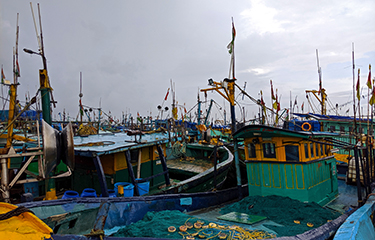The seventh and last installment of the Seafood Metrics Report series, “Progress Toward Sustainable Seafood – By the Numbers” has been released.
The report follows six other metric reports published in 2008, 2010, 2013, 2015, 2017, and 2020, and the latest edition of the report examines global seafood community trends and progress as well as recent key data insights, emergent trends, and best practices – with an additional section on climate and social responsibility. CEA Consulting officially authored the report, which was jointly commissioned by the Walton Family Foundation and the David and Lucile Packard Foundation.
“The field has changed so much over the years, and the Seafood Metrics Report has provided important markers in time. We’ve used this report to track our progress and onboard staff and trustees who are new to the sustainable seafood space," Walton Family Foundation Oceans Initiative Lead and Senior Officer Teresa Ish said. "This report was important for us to contribute to, following the joint Global Seafood Markets Evaluation, because it helped us understand the how much the landscape has changed over time and anchor the findings of the evaluation in a time series."
One theme running throughout the report is increased data collection has expanded knowledge of fisheries’ health. The increase in data estimates about 65 percent of stocks are within biologically sustainable levels, while between 20 to 40 percent of stocks are overexploited or collapsed. The data also demonstrated the pandemic’s impact on the seafood industry, as there was an estimated 22 percent decrease in U.S. commercial landings and a 23 percent decrease in U.S. exports since the 2020 report.
The increased knowledge of fishery health, however, has also highlighted consistent issues within the seafood space. Stock assessment data is only available for half of the global marine fish catch, and almost 50 percent of global stocks remain below biomass targets, the report states.
In addition, the U.S. and E.U. have lagged in making improvements to certain managed fisheries, according to the report.
However, the report added that a growing amount of effort and collaboration is being devoted to fighting against some of the biggest issues to fishery health: illegal, unreported, and unregulated (IUU) fishing and overfishing.
“I’m excited to see continued movement toward more focused and collaborative efforts (both NGO coalitions that are seeking alignment as well as business pre-competitive collaborations) to address the biggest risks to fisheries and ocean ecosystem health – overfishing and IUU fishing – along with the recognition that these drivers of environmental degradation are inextricably linked to impacts on human well-being, livelihoods, and worker rights,” Packard Foundation Global Seafood Markets Strategy Program Officer Sarah Hogan said. “Of course, significant additional work to build understanding, political and corporate will, and shift practices and policies are still needed. I see this being a big part of the future focus of this movement.”
Another theme evaluated from the report is that buyer engagements have been able to expand from the original focus of North American and European retailers to other global markets and regions. This is followed with the fact that more than 85 percent of those regions’ top retailers have made commitments to seafood sustainability. Those buyer engagements, the report adds, have a wider focus, with IUU fishing and human rights becoming more important. Multiple organizations, including labor rights NGOs, consultants operating in the seafood sector, precompetitive collaborations, fishery improvement project implementers, and more are now addressing labor and human rights issues.
However, the report also found that those market-based initiatives have a hard time reaching small-scale fisheries, which make up 40 percent of the total global fisheries catch.
The report also noted growth and innovation in the global aquaculture sector and progress in traceability and transparency efforts.
“It’s inspiring to see how much the seafood markets movement has continually grown in size and importance,” Walton Family Foundation Program Officer Leo Pradela said. “So many partners have reached the inevitable conclusion that social and environmental sustainability are essential to the long-term viability of the seafood industry and have prioritized efforts in that direction.”
Photo courtesy of Chris Chase/SeafoodSource







